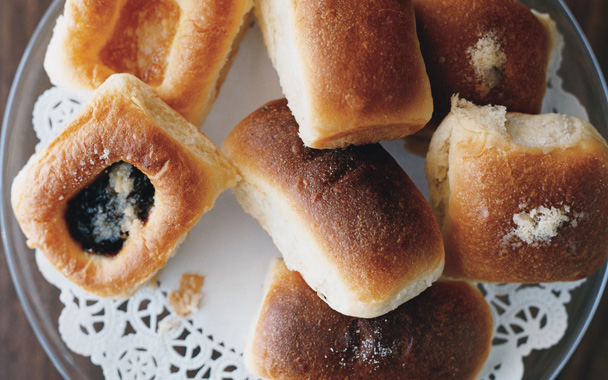In central Texas, kolaches outshine doughnuts. Just north of Waco, the small town of West (known for clarity’s sake as “West Comma Texas”) is the state’s kolache capital, where descendants of Czech immigrants make little square pastries that hold a dollop of fruit rimmed by a puffy pillow of supple dough. It looks vaguely like the Danish you get in any diner, but a really good kolache feels and tastes like a breakfast treat that has gone to charm school. It is so exquisitely tender that a too-eager grip will compress it from a square into a blob. All the good places serve their kolaches within hours of baking. “Koláče [the Czech spelling] are sold warm from the oven,” assures the sign above the counter at the The Village Bakery, a shop with three small tables and one circular ten-seat table that hosts a community coffee klatch most mornings. The coffee drinkers direct us to try apricot and prune, intriguing fillings that aren’t as sweet as the dough itself. They’re the flavors favored by old-timers, along with poppy seeds and cottage cheese. The regulars also tell us that tourists tend to like fruitier versions—apple, strawberry, blueberry—as well as those made with cream cheese.
Fruit and cheese kolaches are old-world standards; The Village Bakery added a Tex-American twist in the early 1950s when baker Wendel Montgomery, concerned that his big loaves of sausage bread weren’t selling well, asked his mother-in-law to come up with a snack-size version that included the sausage links that are another passion of central Europeans who settled in the heart of Texas. Her creation was a gloss on Czech klobásníky, which are customarily made with ground sausage. Purists still refer to them as klobasniki or, possibly, as pigs-in-a-blanket, reserving the term kolache for pastries filled with fruit, cheese, or poppy seeds. The Village Bakery makes regular and hot-sausage versions, the latter marked by two slits in the top of the bun, and you’ll find bakeries that add cheese and jalapeño peppers and even sauerkraut.
The greatest variety we’ve seen is at the Kolache Factory, a 34-store Texas-based chain with outposts in Colorado, Missouri, Indiana, and Kansas. At the Austin store on North Lamar, we order and eat from batches carried from the kitchen while still too hot to handle: classic fruit and cream cheese for under a dollar, plus utterly Americanized meal-in-one kolaches where the sweet dough encloses pockets of bacon, egg, and cheese.
Like any baked pastry, the fresher the kolache, the better it is. Philip Weikel, of Weikel’s Bakery, in La Grange, once had a customer pay $80 for overnight air shipping of $5 worth of kolaches. But ground service works, too—Weikel’s dough defies the laws of staleness. It stays light, moist, and soft for four or five days, something he attributes not to unique ingredients (and certainly not to preservatives) but to the way it is made and handled. “That’s the secret that separates us from bakeries that buy kolache mix in fifty-pound bags: tenderness,” he says. “Tenderness now and tenderness tomorrow.”
Czech-Americans throughout Texas have given Weikel’s kolaches the thumbs-up. The spring weekend we stop by, Weikel had to hightail it the 60 miles to Austin for parts to fix a proofer that broke while his bakers were making 200 dozen for the Concho Valley chapter of the Czech Heritage Society of Texas in San Angelo. “They drove five hours to get to La Grange and five hours to get back,” Weikel says. “They came in an SUV that we had to pack so full that boxes were coming out the windows. It was like, ‘Do not hit the brakes!’”
There are few snacks as authoritative as klobasniki, with their dramatic harmony of supremely tender golden dough around a chewy pork and beef sausage from the meat market over in Schulenburg, and there are no kolaches anywhere more beguiling than Weikel’s little apricot rectangles, in which the fruit’s sunny- sour smack accentuates the yeasty sweetness of the pastry cloud around it. Weikel’s staff are as helpful as can be, inquiring whether we want ours with a lot of powdered sugar or only a little and explaining that we will be able to tell the difference between the similarly colored peach and apricot kolaches because the latter has streusel on top. As we eat, a girl whose ancestry is African-American rather than Czech points with pride to the wide-screen TV behind the counter that is running a video loop showing how kolaches are created and boasting “Made right here on the premises!” She is genuinely troubled when we refer to one of Weikel’s klobasniki as a sausage kolache. “Pig-in-a-blanket is what it is,” she reminds us with the kindly certainty of a specialist.
A word of warning: Weikel’s bears little resemblance to the charming old-world kolache shops in West and elsewhere in Texas. You could walk in for a Coke and a beef stick and not notice that there is something extraordinary at the back of the store, where the bakery does business. The place looks like a gas station, which is what it is. After Philip’s father closed the Bon Ton Restaurant in the early 1980s, his family’s aim was to have a bakery that would appeal to locals but also a store that would attract passersby along busy State Highway 71. So they opened a Shell station with convenience-store amenities and a bakery in back. There is one big hint outside to let travelers know they have found a special place. The sign rising high above the building and the gas pumps reads: “Weikel’s Bakery—We Got’cha Kolache.”
Address Book
Kolache Factory 3706 N. Lamar Blvd., Austin, TX (512-467-2253; kolachefactory.com)
The Village Bakery 113 E. Oak St., West, TX (254-826-5151)
Weikel’s Store and Bakery 2247 W. State Hwy. 71, La Grange, TX (979-968-9413; weikels.com)



 Pinterest
Pinterest






